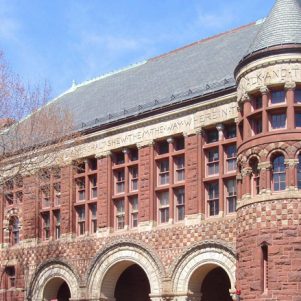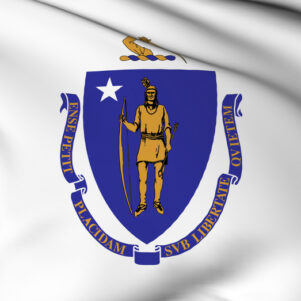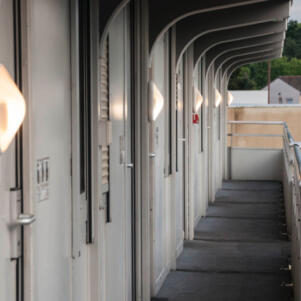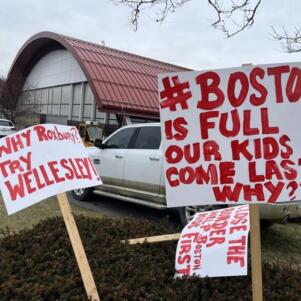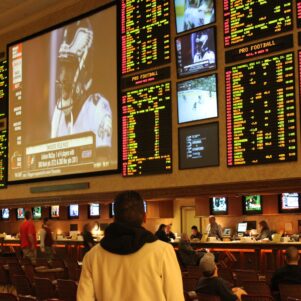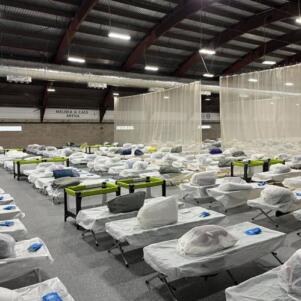In Boston, liquor licenses can play a key growth role
By Beth Treffeisen | March 7, 2016, 0:01 EST
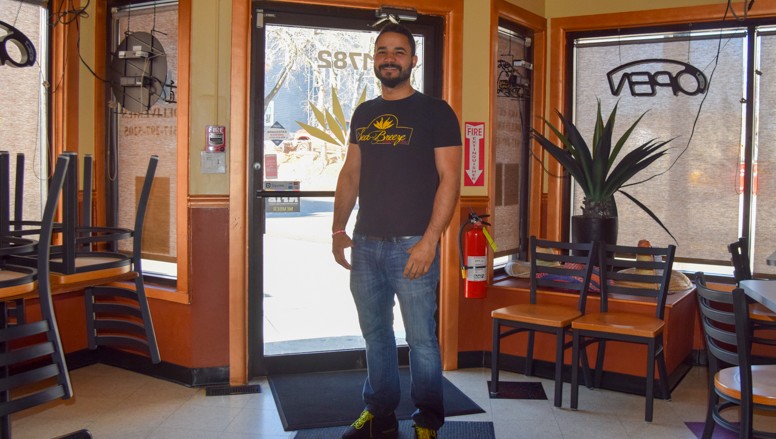 Owner Joandry Vasquez stands in front of his restaurant Sea Breeze Mexican Grill in Dorchester (New Boston Post photo by Beth Treffeisen)
Owner Joandry Vasquez stands in front of his restaurant Sea Breeze Mexican Grill in Dorchester (New Boston Post photo by Beth Treffeisen) BOSTON – Located off busy Dorchester Avenue, the Sea Breeze Mexican Grill serves up traditional food to locals looking for an authentic meal.
With just seven tables, it offers a relatively small space for patrons to enjoy lunch or dinner. But until recently there was something missing – cold beer to wash down the flavorful food.
While owner Joandry Vasquez opened the restaurant in January 2014, he had to wait a year to get a license to sell beer and wine. But at least he didn’t have to pay a fortune for the permit as most Hub restaurant operators do.
All it cost Vasquez was a “processing fee” of about $2,220 under a city program designed to help businesses in certain neighborhoods, like the one in Dorchester where the Sea Breeze is located. Now that he can sell beer and wine, the restaurateur says his grill can draw more sit-down customers and focus less on take-out service.
“It’s not easier, but it’s better,” Vasquez said about having the pouring license. Customer previously would ask if he served beer. Now, he said, “they sit down, talk and stay longer.”
Before the program began, the type of liquor license the corner restaurant received simply cost too much for Vasquez to afford.
Under state law, 970 liquor licenses are available to businesses in Boston, including beer and wine, and all liquor varieties. Virtually all of them have been assigned, so typically a new business must “buy” a license from an existing holder. Today, the price averages around $400,000 – far more than a shop the size of the Sea Breeze can usually afford.
“When liquor licenses go to the highest bidder, it tends to concentrate in a different neighborhood of the city,” Jenn Cartee, the executive director of St. Mark’s Main Street, a nonprofit corporation that brings together local businesses, residents, neighborhood organizations and community partners to strengthen local commerce, about development of new restaurants and cafes. “It tends to cluster in the downtown area where all the fabulous restaurants that we all love are.”
A city program to provide 75 licenses to businesses in neighborhoods that have struggled to attract economic development aims to provide more balance in under-served areas. Begun in 2014, it marked the first time City Hall had new licenses to distribute in 100 years. The distribution is slated to take place over three years, and so far 40 have gone to targeted neighborhoods while 10 have been made available to operators from all over Boston.
“It’s an opportunity for every neighborhood place” trying to deliver service local customers want, he said. And it’s more convenient for people in the community. “They can stay here and won’t have to drive to places that are booming like South Boston or downtown.”
While the Sea Breeze may never challenge much bigger destination restaurants downtown, being able to serve beer and wine can make it more appealing.
“It would never be viable competing with Legal Seafood’s,” said Cartee. Still, she said the pouring license “has provided a bit more wiggle room” to the Sea Breeze.
Vasquez said the program seems to be working in his area.
“I see the change and it’s going to get better,” he said. “Dorchester will be the next gem.”
But there’s a catch to the program – if a venue like the Sea Breeze should cease to operate, it can’t sell the pouring license to the highest bidder. Instead, it has to return it to the city, which can then hand it out to another business.
As for the unrestricted licenses, each of the 10 issued thus far amounted to an instant windfall for the recipient, as they can be resold.
“Everybody who had their act together applied for them as fast they could,” said John P. Connell, a lawyer whose specialties include the laws and procedures involved in obtaining a liquor license. “In order to receive one of the unrestricted licenses, they had to be there at the right time and the right place.”
A bill pending in the state Legislature would raise limits on liquor licenses available in other Bay State cities and towns, which are currently limited to no more than one for every 1,000 residents. But critics say its passage could undermine the value of existing licenses to their current holders.
In the Hub, the Boston Redevelopment Authority has designated certain Main Streets Districts and neighborhoods where businesses can qualify for one of the restricted licenses, including in Dorchester, East Boston, Hyde Park, Jamaica Plain, Mattapan, Mission Hill and Roxbury. The final group of 20 restricted and five unrestricted licenses will become available on Sept. 1.
Of those restricted licenses already issued, more have gone to operators in Dorchester, at 14, than to any other area. Businesses in Main Streets districts have received nine and five went to merchants in Roxbury. A few each have been distributed in other areas, including four each in East Boston and Jamaica Plain, and two each in Mission Hill and Hyde Park.
Fostering a mix of development that includes housing, restaurants and other types of businesses provides a way for local residents to engage with the neighborhood and the resulting activity promotes the area, said Kristen Scanlon, a lawyer specializing in restaurant licensing and a strategic partner with McDermott Ventures in Boston.Kristen Scanlon, a lawyer specializing in restaurant licensing and a strategic partner with McDermott Ventures in Boston.
“You get more foot traffic, lights on the street – it creates a ripple effect of economic development,” Scanlon said. She said so many restricted licenses going to companies in Dorchester may reflect a surge in economic growth there, allowing restaurateurs there to find attractive locations and develop effective business plans.
“People are starting to realize that Dorchester is a destination for restaurants,” said Randace Rauscher, executive director of the Fields Corner Main Street organization in the neighborhood. “It’s been booming for years.”
Map of Neighborhood Restricted Licenses:
NBPUrban

